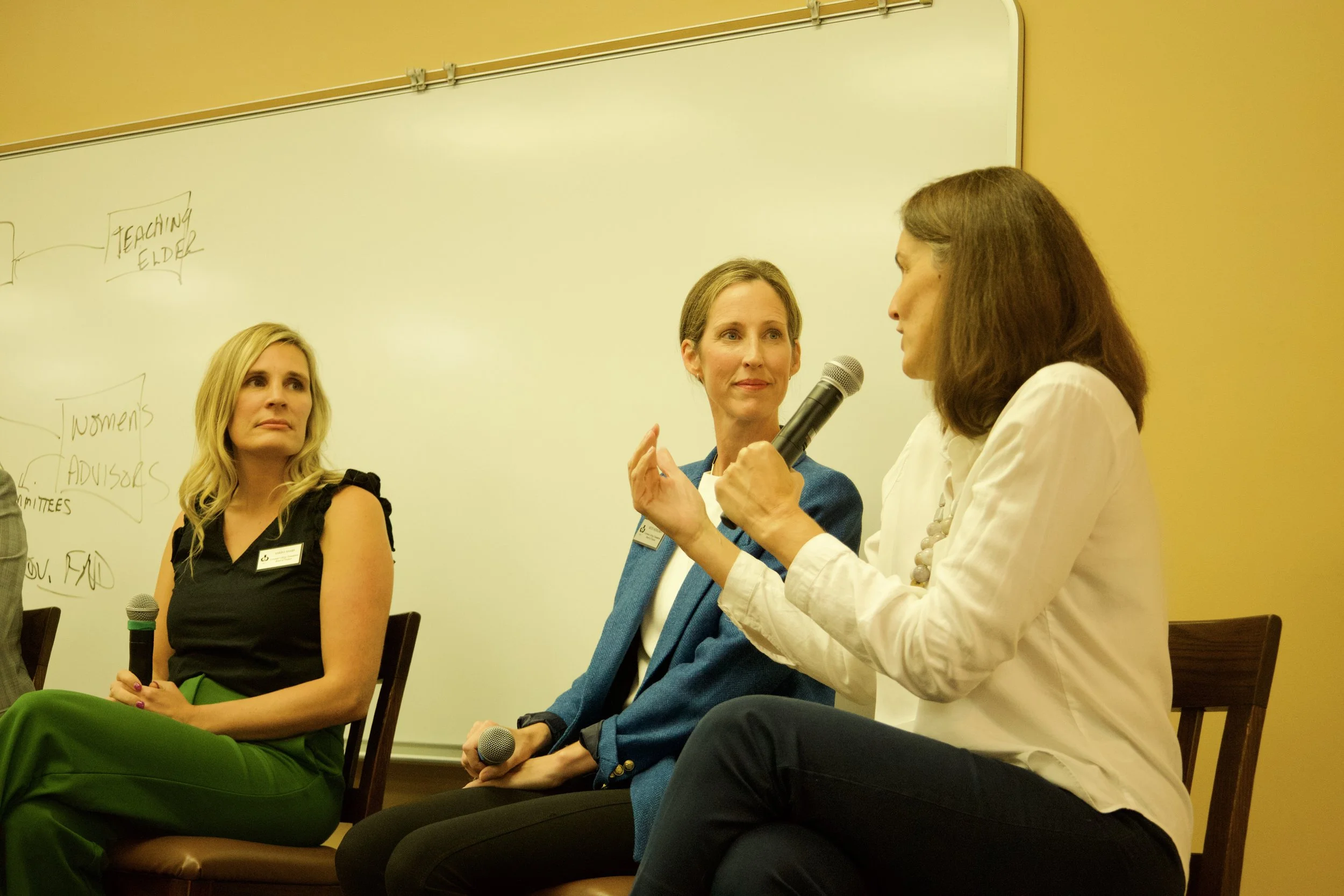The ability for women to serve on Covenant College’s Board of Trustees is a subject of great interest to many faculty members, staff and students. The voting members of the Board are men, per the PCA General Assembly’s guidelines that only ruling and teaching elders (male only positions within the denomination) can hold office.
Sarina Sharp '08, Beth Nedelisky '03, and Christy Grauley share their experiences being advisors to the Board of Trustees, Wednesday, October 11, 2023.
In the past years, more questions have been raised concerning this rule. In 2018 and 2019, the college and the Tennessee Valley Presbytery brought forth overtures to the General Assembly to amend the denomination’s documents to allow people besides ordained elders to sit on the Board. The General Assembly voted down the overtures both years.
Many students, particularly at an institution whose student body is over 50% female, have questions and concerns about why women are denied this position. Because students are told that women cannot serve on the Board, they are surprised when they learn that women can be Board advisors. Most are not aware that women are involved in this capacity or what the title of “advisor” entails.
On Wednesday October 11, the college hosted a panel discussion to explain the role of women on the Board to students. The panel was led by Stephanie Formenti, with panelists Dick Bowser (trustee), and three women advisors, Christy Grauley, Beth Nedelisky ‘03, and Serena Sharp ‘08. This was an opportunity for the panelists to inform students about the Board’s structure, as well as a time for the advisors to share their experiences.
After introductions, Bowser began the conversation with a discussion of PCA policy and who comprises the Board.
Bowser explained that the college is one of many denominational agencies under the authority of the General Assembly (GA). Only ruling or teaching elders may serve on the boards of PCA agencies, meaning that women and non-ordained men are always excluded. Therefore, Covenant’s Board of Trustees is composed of twenty-eight all-male voting members.
However, there are two other boards that branch from the Board of Trustees—the Alumni Advisors Board and the Women Advisors Board, both of which are not limited to ordained officers. These advisor boards have thirteen members in total, ten of whom are women.
In addition, each board member serves on committees. In committees, men and women have equal privilege of the floor and the right to vote. When the Board of Trustees votes on final matters though, advisors are not given a vote at that time.
Grauley, Nedelisky and Sharp all emphasized the importance of committee-level work. Committees do the bulk of the research and report their findings to the trustees. In turn, the Board listens to what its committees and advisors have to say and acts accordingly.
Because of how much she feels the Board values the advisors’ input, Grauley said, “There’s never been a [final] decision where I wish I had a vote.”
The panelists also spoke about their experiences as women on the Board, and their testimonies were remarkably positive. They feel valued and encouraged to step into their positions.
“I feel that my gifts are used and celebrated, and I am often asked to lead or encouraged to speak up,” said Sharp.
Nedelisky echoed Sharp’s comments. “There’s no shortage of opportunity to serve the college in meaningful ways,” she said, “My opinions are really valued, and my skills are being used.”
However, one matter mentioned during the panel was the 2020 Godly Response to Abuse in the Christian Environment (G.R.A.C.E.) Report, which used interviews and surveys to look at the experiences of female students and workers compared to their male counterparts. The results of G.R.A.C.E. revealed that women had significantly lower satisfaction than men, particularly due to lack of female leadership on campus.
One student asked the panel about G.R.A.C.E. during the Open Q&A. Panelists affirmed that this report is a huge concern that the college is actively working on.“It’s part of the reason I’m here tonight,” Nedelisky said.
While the women acknowledge room for improvement on the Board and are open to future change, they are grateful for the PCA’s commitment to biblical faithfulness. “This is an opportunity to submit biblically to the denomination we’ve chosen to be under,” Sharp said.
The panel discussion was ultimately centered on gratitude for Covenant. Nedelisky sees her role as preparing the college for future generations. Sharp charged the audience to use their gifts for God’s kingdom regardless of gender. And Grauley is thankful for the people praying for her colleagues and the institution.
While the ability for women to be full voting members of the college’s Board of Trustees is not a closed debate, the panel helped spread awareness around campus about the Board’s structure and how women are involved in building up the Covenant community.

